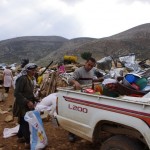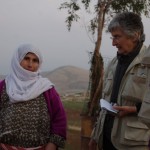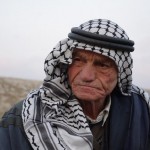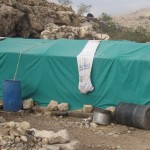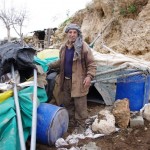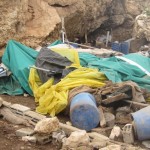09 February 2011 | Palestinian Centre for Human Rights
The Palestinian Centre for Human Rights (PCHR) strongly condemns the targeting of civilian establishments in the Gaza Strip by aircraft of the Israeli occupation forces (IOF) early this morning. Ten Palestinians, including two women and a child, were wounded as a result of the bombing. In addition, a factory was destroyed, a drug store belonging to the Ministry of Health in Gaza was set on fire, and a school and wood warehouses were partially damaged. PCHR calls upon the international community, including the High Contracting Parties to the Fourth 1949 Geneva Convention relative to the protection of civilian persons in time of war, to exert pressure on IOF to ensure respect for the provisions of the Convention, especially those relating to the prohibition of the destruction of civilian property and objects and to the special protection ensured by the Convention to medical facilities and medical personnel.
According to PCHR investigations, at approximately 00:05, an IOF warplane fired a missile at Hashem Hetto Sons Plastic Company. The Company, which is owned by Mohammed Hashem Rabah Hetto, 23, and which is under construction is located on Salah Addin Street, east of al-Tufah neighborhood in the east of Gaza City. It covers an area of 1,200 m2. The bombing resulted in the total destruction of the company, the destruction of a Renault model 1998 carrying registration plate no. 489591 which is owned by Hetto, and in the destruction of a Del crane model 1995.
Further, heavy damages were caused to a drug store belonging to the Ministry of Health, one of the main drug stores belonging to the Ministry of Health in Gaza. The store, which covers an area of 700 m2 and which contains drugs and medical supplies, is leased from its owner Abdul Karim Mohammed Abdul Karim Abu Ras, 26. The wall, gate and ceiling of the store were heavily damaged, the store was set on fire, and drugs were damaged. It should be noted that the store contained large quantities of drugs and medical supplies, most notably medical aid supplied by foreign delegations that visited Gaza during the few past months. Dr. Munir al-Barsh, Director General of the Pharmacy Department at the Ministry of Health in Gaza, stated that the destruction of the store would result in an exacerbation of the serious shortage in drugs and medical supplies sustained by the health sector. He added that 183 drugs and 190 items of medical supplied are currently in short supply.
This morning, a PCHR fieldworker visited the store with members of the Committee for Supporting the Health Sector which is made up of the Palestinian NGO Network (PNGO) and human rights organizations from the Gaza Strip. Smoke was still rising from drug and medical supplies containers inside the store. The PCHR fieldworker observed the damages caused to the walls, the main gate and the ceiling of the store. In view of the shortage in drugs and medical supplies suffered by the health sector, the Committee for Supporting the Health Sector had organized a field visit three weeks earlier to the above-mentioned store and to other drug stores in the Gaza Strip.
The same IOF strike also inflicted partial damages on a factory belonging to the Oda Textile Company. The factory, which is owned by Jawad Mohammed Ibrahim Oda, 48, covers an area of 1,200 m2. Some machines and walls in the factory were damaged.
In addition, Nour al-Maaref Standard School, a private school owned by Sami Alian Abu Eida, 47, was damaged. Windows, doors and classrooms in the school were entirely destroyed. The ceiling and the eastern walls of the school were partially damaged. The administration of the school was forced to suspend classes from today, Wednesday, until next Sunday. The school, which covers an area of 6,000 m2, provides educational services to 625 students and employs 60 teachers.
Furthermore, partial damages were caused to four wood warehouses. These warehouses are owned by Mjahed Mahmoud Rateb al-Sousi, 44. They cover an area of 1,700 m2 in total. Walls and furniture were damaged as shrapnel from the bombing and glass entered the warehouses.
Eleven civilian locals, including four children, were lightly wounded or suffered from shock due to the panic experienced as a result of the bombing.
PCHR condemns the IOF’s indiscriminate attacks in the Gaza Strip and expresses its surprise at the conspiracy of silence practiced by the international community towards war crimes committed by IOF against civilian establishments, including medical and educational establishments and civilian property owned by Gaza’s civilian population. PCHR is also astonished by the role played by the High Contracting Parties to the Fourth Geneva Convention of 1949, which effectively encourages IOF to commit serious violations and war crimes against Palestinian civilians in the Occupied Palestinian Territories (OPT). PCHR poses the question whether these Parties actually exert efforts to ensure States Parties’ respect of the Convention.
In view of the above, PCHR calls:
1. Upon the international community to promptly and urgently take action in order to put an end to the serious violations committed by IOF against Palestinian civilians. PCHR particularly calls for deterrent measures against IOF in order to ensure respect for all the provisions of the Fourth Geneva Convention.
2. For an immediate conference of the High Contracting Parties to the Fourth Geneva Convention of 1949 in order to seriously discuss the application of the Convention to the OPT, ensure its respect and promptly take action to activate Articles 1, 2, 146 and 147 with the aim to ensure the State of the Israel’s respect of the Convention by the.
3. For the application of the provisions of Chapter VII of the Charter of the United Nations to the State of the Israel with the aim of ensuring international security and peace and to ensure immediate international protection to the Palestinian civilians in the OPT against flagrant violations committed by IOF against the Fourth Geneva Convention.
4. Upon the European Union to activate Article 2 of the Euro-Israeli Association Agreement, which makes Israel’s respect for the International Human Rights Law and the International Humanitarian Law as a condition for economic cooperation.
5. For the urgent provision of humanitarian and medical aid. PCHR points to the deterioration of economic and living conditions of the Palestinian people in the OPT as a result of the ongoing closure and the continued attacks against Palestinian property.



